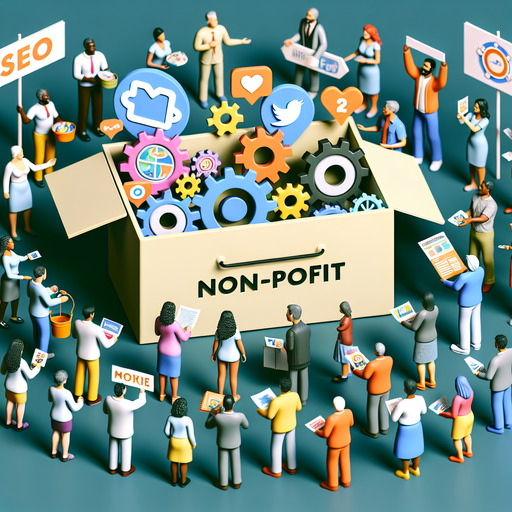
-
Table of Contents
Unlock the potential of your non-profit with the right marketing tools! Discover essential strategies for success. Learn more here.
Introduction
Non-profit marketing is a specialized field that requires a unique set of tools and strategies to effectively promote an organization’s mission, engage supporters, and drive donations. Unlike for-profit marketing, non-profit marketing focuses on building relationships, raising awareness, and inspiring action for a cause rather than generating profit. To achieve success, non-profits must leverage a variety of marketing tools that cater to their specific needs. These tools include social media platforms for outreach and engagement, email marketing software for personalized communication, content management systems for maintaining an informative and user-friendly website, and donor management systems for tracking contributions and managing donor relationships. Additionally, non-profits benefit from using analytics tools to measure the effectiveness of their campaigns and make data-driven decisions. By integrating these tools into their marketing strategy, non-profits can enhance their visibility, foster community support, and ultimately achieve their organizational goals.
Non-Profit Marketing Tools: What You Need for Success
Non-profit organizations often face unique challenges when it comes to marketing. Unlike for-profit businesses, non-profits must balance their mission-driven goals with the need to attract donors, volunteers, and supporters. To achieve this delicate balance, non-profits require a suite of marketing tools that can help them effectively communicate their message, engage their audience, and drive action. Understanding and utilizing these tools can significantly enhance a non-profit’s ability to succeed in its mission.
One of the most essential tools for non-profit marketing is a robust Customer Relationship Management (CRM) system. A CRM helps organizations manage and analyze interactions with current and potential supporters. By keeping track of donor information, volunteer activities, and engagement history, a CRM enables non-profits to tailor their communications and outreach efforts. This personalized approach can lead to stronger relationships and increased support. Additionally, many CRM systems offer automation features that can save time and ensure consistent follow-up with donors and volunteers.
In conjunction with a CRM, email marketing platforms are indispensable for non-profits. Email remains one of the most effective channels for reaching supporters. Platforms like Mailchimp or Constant Contact allow non-profits to create targeted email campaigns, segment their audience, and track the performance of their emails. By analyzing open rates, click-through rates, and other metrics, non-profits can refine their messaging and improve their engagement strategies. Moreover, email marketing platforms often integrate seamlessly with CRM systems, providing a cohesive approach to managing supporter relationships.
Social media management tools are another critical component of a non-profit’s marketing toolkit. Social media platforms such as Facebook, Twitter, and Instagram offer unparalleled opportunities for non-profits to connect with a broad audience. Tools like Hootsuite or Buffer enable organizations to schedule posts, monitor engagement, and analyze performance across multiple social media channels. By maintaining a consistent and active presence on social media, non-profits can raise awareness, share their stories, and mobilize supporters. Furthermore, social media advertising can be a cost-effective way to reach new audiences and drive traffic to a non-profit’s website or donation page.
Speaking of websites, having a well-designed and user-friendly website is fundamental for any non-profit. A website serves as the central hub for information about the organization, its mission, and its impact. Website builders like WordPress or Wix offer customizable templates that can help non-profits create professional-looking websites without the need for extensive technical expertise. Additionally, incorporating features such as donation forms, event registration, and volunteer sign-ups can streamline processes and enhance the user experience. Search engine optimization (SEO) tools can also be employed to improve the website’s visibility on search engines, making it easier for potential supporters to find the organization online.
Content creation tools are equally important for non-profit marketing. High-quality content, whether in the form of blog posts, videos, or infographics, can effectively convey a non-profit’s message and inspire action. Tools like Canva for graphic design, Adobe Spark for video creation, and Grammarly for writing assistance can help non-profits produce engaging and polished content. By regularly sharing compelling stories and updates, non-profits can keep their audience informed and motivated to support their cause.
Finally, analytics tools are crucial for measuring the success of marketing efforts. Google Analytics, for example, provides valuable insights into website traffic, user behavior, and conversion rates. By analyzing this data, non-profits can identify what strategies are working and where improvements are needed. This data-driven approach ensures that marketing efforts are both effective and efficient, ultimately leading to greater impact.
In conclusion, non-profit marketing requires a strategic approach and the right set of tools. By leveraging CRM systems, email marketing platforms, social media management tools, website builders, content creation tools, and analytics, non-profits can enhance their outreach, engage their audience, and drive meaningful action. With these tools in hand, non-profits are well-equipped to achieve their mission and make a lasting difference.
Q&A
1. **What are some essential non-profit marketing tools for success?**
– **Email Marketing Platforms**: Mailchimp, Constant Contact
– **Social Media Management Tools**: Hootsuite, Buffer
– **Content Management Systems (CMS)**: WordPress, Wix
– **Customer Relationship Management (CRM) Software**: Salesforce, Bloomerang
– **Graphic Design Tools**: Canva, Adobe Spark
– **Fundraising Platforms**: GoFundMe, Classy
– **Analytics Tools**: Google Analytics, Hotjar
– **Event Management Software**: Eventbrite, Cvent
– **Volunteer Management Tools**: VolunteerHub, SignUpGenius